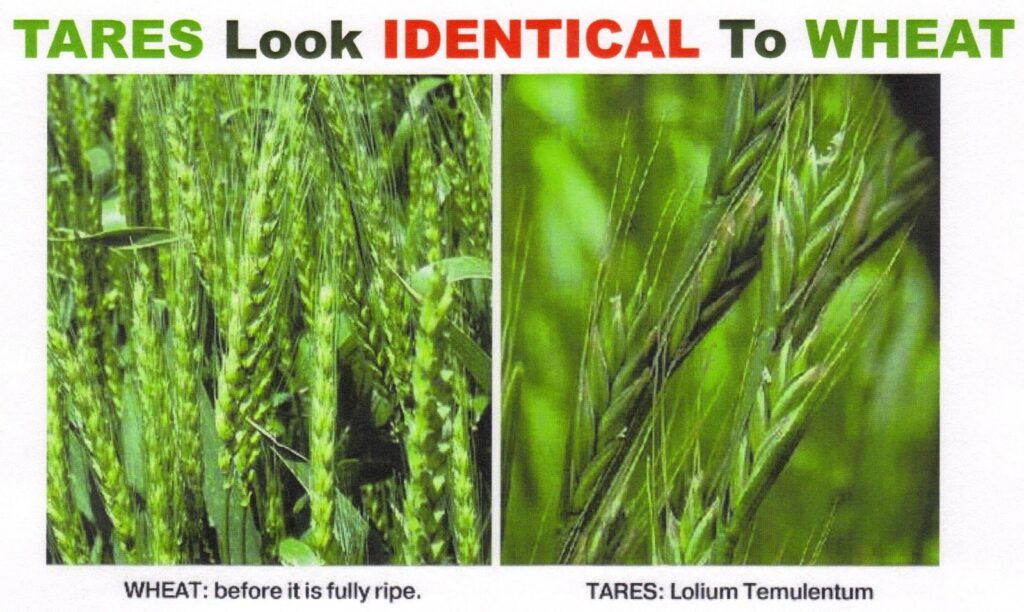The parable of the wheat and the tares (weeds) is one of the lections (readings) for this Sunday. Like all good parables, it doesn’t make immediate sense. Even after reading the explanation given by Jesus.
It’s a parable, a simple story with deep, mystical meaning, often pushing the hearer into a corner, confronting him or her with a decision. Jesus is famous for disturbing ordinary lives with troubling stories. Troubling partly because they challenge our ideas about God. (As I said last week).
This is my summary of the parable (Matthew 13: 24-30;36-43)
A farmer sows his field with seeds of wheat. At night, an enemy does something illegal. He sows seeds of a weed on the same field. He sows Darnel, a poisonous plant which “looks like” wheat while it’s growing. It can only be detected after it’s grown awhile.
After a while, the farmer detects the weeds. He decides not to uproot the weeds till harvest time.
This is Jesus’ explanation:
“37 … “The one who sows the good seed is the Son of Man. 38 The field is the world, and the good seed is the sons of the kingdom. The weeds are the sons of the evil one, 39 and the enemy who sowed them is the devil. The harvest is the end of the age, and the reapers are angels. 40 Just as the weeds are gathered and burned with fire, so will it be at the end of the age. 41 The Son of Man will send his angels, and they will gather out of his kingdom all causes of sin and all lawbreakers, 42 and throw them into the fiery furnace. In that place there will be weeping and gnashing of teeth. 43 Then the righteous will shine like the sun in the kingdom of their Father. He who has ears, let him hear.
Matthew also tells us Jesus introduced this parable as a teaching about the kingdom of heaven (kingdom of God), calling Himself “Son of Man.” Bible scholar Bruce J Malina tells us “The word ‘kingdom’ by any estimation is a word describing a society’s political institution. It is, in origin, a political term.”
This is my outline of how Jesus explained the parable:
- In the world, there are good people, and not-good people.
- Good people are Jesus-like.
- Not-good people are not Jesus-like; the Devil loves them.
- The world will end.
- The not-good people will be dark with punishment.
- The good people will be bright with acceptance.
Matthew includes six other parables in this collection (chapter) which is at the centre of his Gospel.
The parable of the soils which I discussed last week.
Two parables of people who recognize the great value of the Kingdom. One is about buried treasure; another is about a pearl.
A parable about yeast tells of the slow but sure growth of the Kingdom.
A parable about a big tree springing from a small seed. It tells of the eventual vastness of the Kingdom.
A parable about sorting good fish and not-good fish caught in a dragnet. This reinforces the teaching of the parable of the wheat and the weeds.
Matthew rounds off his account of the seven kingdom parables by recalling how Jesus rounded off his teaching to the first disciples:
51 “Have you understood all these things?” They said to him, “Yes.” 52 And he said to them, “Therefore every scribe who has been trained for the kingdom of heaven is like a master of a house, who brings out of his treasure what is new and what is old.”
I keep asking myself what the disciples understood.
Did they think of wheat and weeds when Jesus was betrayed by Judas, and when the crowd brayed “free Barabbas!” before Pilate sentenced Jesus to death by crucifixion? (Matthew 27)
Did Matthew write the way he did – interpreting passages from the Old Testament as predictions about Jesus – as an application of bringing “out of his treasure what is new and what is old”? Do we do the same?
Did the apostles gathered at the Council of Jerusalem (Acts 9) think of wheat and weeds when they discussed Saul, persecutor of Christians, who said he’d become a disciple? Was Paul weed transfigured into wheat, or good seed planted by Jesus? Was Paul an exception to the parable?
Do we think of this parable when we read Paul’s command “you are to deliver this man to Satan for the destruction of the flesh, so that his spirit may be saved in the day of the Lord”? (1 Cor 5:5)
What’s the message of the parable of the wheat and weeds for us today? G R Beasly-Murray, in Jesus and the Kingdom of God (1986), says:
… more than the others, the parable emphasizes the fact that the function of the divine sovereignty in this time is to save men, not to judge them.
Fear weeds. Watch out for weeds. Be sure you’re not a weed. Be comfortable with uncertainty.
To learn more about Rama, click here.



Pingback: How do they know she’s a Christian? – Bangsar Lutheran Church
I prefer PADI and PADI Field to wheat. Inside PADI Field is just like the Kingdom and we are protected within the square of bunds erected to contain water. No tares or Lalang is excluded with occasion pecking of small birds and insects intrusion from the outside world nevertheless rooted within the community of believers in his kingdom
Pingback: Why did Jesus wreak havoc on the trading floor? – Bangsar Lutheran Church